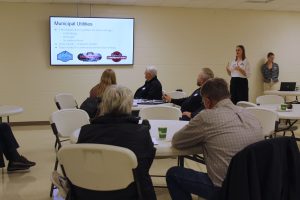 Without the resources and population levels of larger cities, rural counties tend to turn to local leadership to guide their path forward. The Clayton County Energy District (CCED) maintains partnerships with community leaders to advocate, educate, and implement a clean energy transition to reduce the percentage of income spent on energy. Beyond internal outreach efforts, the CCED relies on these partnerships to promote the Energy District as a community resource for inclusive energy burden reduction. Local leadership can assist the CCED in ensuring everyone in Northeast Iowa has full knowledge of the opportunities they have right now to access clean energy technology. Additionally, they can rely on the Energy District to provide program benefits, community education/outreach, and local advocacy.
Without the resources and population levels of larger cities, rural counties tend to turn to local leadership to guide their path forward. The Clayton County Energy District (CCED) maintains partnerships with community leaders to advocate, educate, and implement a clean energy transition to reduce the percentage of income spent on energy. Beyond internal outreach efforts, the CCED relies on these partnerships to promote the Energy District as a community resource for inclusive energy burden reduction. Local leadership can assist the CCED in ensuring everyone in Northeast Iowa has full knowledge of the opportunities they have right now to access clean energy technology. Additionally, they can rely on the Energy District to provide program benefits, community education/outreach, and local advocacy.
On November 19th the CCED, in partnership with the Winneshiek and Allamakee Energy Districts, hosted a Clean Energy Forum in Postville for local leadership in the three counties. Invitees included county officials, city council members, economic development groups, community foundations, business owners, and elected representatives. This regional forum was designed to bring a diverse group of leadership together to explore clean energy efforts in surrounding counties and discuss how Energy Districts and their partners can work together to strengthen rural communities.
For the CCED, Coordinator Kelsi Davis highlighted the importance of municipal electric utilities (MEUs). The Iowa average of MEUs by county is about 1.5, but Clayton County has 3 in Guttenberg, Strawberry Point, and McGregor. MEUs therefore, serve nearly 1/3 of Clayton County electric meters presenting a unique opportunity to build municipal energy resources to reduce energy burden and greenhouse gas emissions for hundreds of residents. Davis also shared a recent clean energy win in Elkader:
RISE Ltd. is a non-profit organization providing programs and services to individuals of all ages with intellectual disabilities, mental illnesses, brain injuries and other developmental disabilities. Following an energy coaching session from the CCED RISE installed LED lighting and a solar system. After activating the system in November of 2023 their electric bills were cut in half. By summer of 2024, their bill went from over $900 to just over $20. The CCED was also able to connect RISE to the Inflation Reduction Act elective pay option providing a direct payment to the organization for 30% of the system cost. RISE is expecting a $23,000 payment, raising their return on investment to $175,000 over 25 years. Instead of spending those funds on electricity, RISE can now expand existing programs and establish new ones for their clients.
Following the presentation at the Forum, the Energy Districts answered group questions regarding the scope of their work and previous partnerships. One main point was the idea of partnerships with unexpected or previously unconsidered groups who may have environmental or community concerns adjacent to clean energy. The perspective of multiple organizational viewpoints remains so important when devising strategies or coordinating projects for overall community improvement. Attendees also participated in group discussions to explore questions of clean energy impacts and community needs across counties. These questions generated interesting discussion, especially from the elected representatives in attendance including State Senator Mike Klimesh and Georgie Hilby, an aid from U.S. Representative Ashley Hinson’s office. Senator Klimesh posed an interesting question about establishing consistent clean energy zoning policy at the state level to end the night, which the CCED looks forward to hearing more about in the future.
